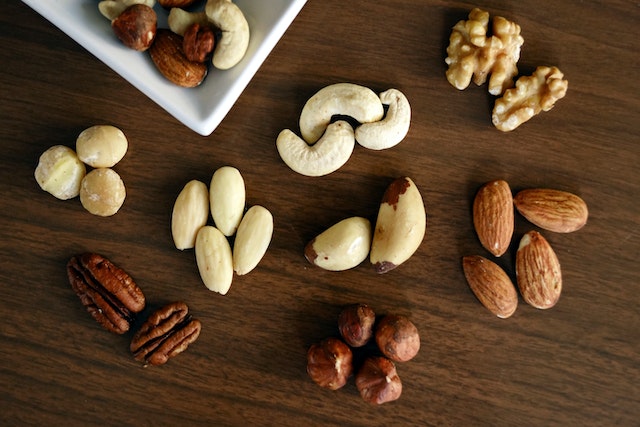Macadamia nuts are an excellent choice of snack for those who have diabetes or high levels of blood glucose. When consumed on their own, they make for a delicious snack that is low in glycemic index and rich in monounsaturated fats.

They are also the ideal food to pair with other carbohydrate-containing meals and snacks in order to help decrease the glycemic index of those meals and snacks.
Contents
Macadamias nuts and blood sugar levels
Due to the fact that macadamia nuts only contain trace quantities of carbohydrates, eating them has been shown to have a beneficial effect on blood sugar levels.

They help decrease the glycemic index of a meal or snack that includes carbs because the fat, protein, and fiber they contain slow digestion, which in turn slows the release of glucose from meals containing carbohydrates. This lowers the glycemic index of the meal or snack.
Macadamias nuts and type 2 diabetes

Consuming nuts may assist persons with type 2 diabetes in improving their blood glucose levels, as has been shown by scientific research. Nuts like macadamias include nutrients, fat, fiber, and polyphenols that may assist boost insulin activity. This means that after eating nuts like macadamias, blood glucose levels do not increase as much as they normally would.
Macadamias nuts and weight loss
People who are attempting to reduce weight may find that eating macadamia nuts, which are rich in good fats, is helpful. In addition, one serving of macadamia nuts is an excellent source of copper, dietary fiber, manganese, and thiamin.
Macadamias nuts nutrition facts

When compared to the fat content of other popular nuts like almonds, cashews, and walnuts, macadamia nuts have a greater percentage of total fat. A bag of macadamia nuts that weighs 50 grams has a total of 38 grams (g) of fat.
On the other hand, around 80% of the fat in macadamia nuts is monounsaturated fat, which is a kind of fat that is beneficial to human health.
Additionally, these nuts include certain types of monounsaturated fatty acids (MUFAs), the likes of which are not easily accessible in a great number of other meals.
Like other types of nuts, Macadamia nuts have a low glycemic index. Macadamia nuts are an excellent addition to any diet due to their many positive effects on human health.
Health benefits of macadamia nuts

1. They lessen the chance of developing heart disease.
According to research, consuming tree nuts of any kind led to a reduction in total cholesterol, low-density lipoprotein cholesterol (often known as "bad" cholesterol), and triglycerides.
The levels of high-density lipoprotein (HDL), sometimes known as "good" cholesterol, may be increased by reducing the consumption of saturated fats and increasing the consumption of monounsaturated and polyunsaturated fats, such as those found in nuts.
2. They are packed with several types of antioxidants.
Like most other types of nuts, Macadamia nuts are an excellent source of antioxidants. Free radicals are unstable chemicals that may damage cells and raise the risk of illnesses such as diabetes, Alzheimer's disease, and heart disease.
Antioxidants eliminate free radicals from the body so that these harmful effects are mitigated. In addition, the quantities of flavonoid antioxidants found in macadamia nuts are among the highest seen in any tree nut.
This anti-inflammatory antioxidant also aids in bringing cholesterol levels down. In addition, this nut has a high concentration of tocotrienols, a type of vitamin E that is loaded with antioxidants and has the potential to assist in reducing cholesterol levels.
According to the findings of a study, these substances may even provide some protection against cancer and other disorders of the brain.
3. Macadamia nuts may lower your risk of heart disease.
According to research, consuming 0.3–1.5 ounces (8–42 grams) of these nuts on a daily basis will reduce overall cholesterol levels as well as LDL (the "bad") cholesterol levels by up to 10%.
Interestingly, a diet heavy in macadamia nuts decreased levels of LDL just as well as the heart-healthy, low-fat diet that the American Heart Association suggests. This was supported by research conducted on patients who already had high cholesterol levels.
In addition, research suggests that daily consumption of 1.5 to 3 ounces (42–84 grams) of macadamia nuts may considerably lower signs of inflammation. Researchers speculate that macadamia nuts' high monounsaturated fat content may be responsible for their beneficial effects on the cardiovascular system.
There is mounting evidence that consuming this nut is associated with improved cardiovascular health and a reduced risk of fatal heart attacks and strokes.
4. It May improve gut health
Because of the high fiber content, eating macadamia nuts is beneficial for digestion and the digestive tract's general health. As is the case with the vast majority of nuts, the soluble fiber found in macadamia nuts can operate as a prebiotic, which means that it may help feed the good bacteria found in the gut.
These beneficial bacteria, in turn, create short-chain fatty acids such as acetate, butyrate, and propionate. These acids have anti-inflammatory properties and may protect against illnesses such as Crohn's disease, irritable bowel syndrome (IBS), and ulcerative colitis.
There is some evidence that eating foods high in short-chain fatty acids may lower the chance of developing diabetes as well as obesity.
Side Effects of Eating Macadamia Nuts

1. Those who are allergic to tree nuts should steer clear of them.
Allergies to tree nuts are a very dangerous condition that may even be fatal. Some people's allergic reactions may be triggered by breathing even minute particles of the food they are sensitive to, such as nuts. Macadamia nuts should be absolutely avoided by anybody who suffers from a nut allergy.
People who reside in the same household as someone who is allergic to nuts should also avoid eating nuts. This is because there is a possibility that they will be exposed to traces of nuts via accidental contact or cross-contamination.

2. They are high in calorie content.
Macadamia nuts have about 950 calories in only one cup, which is equal to 132 grams. This may be more than half of a person's daily calorie need. However, a serving of macadamia nuts is often measured to be one ounce (oz), which is equal to 28.4 grams. This is much less than one cup.
A serving size of 1 ounce (or around 10–12 nuts) has approximately 200 calories. Utilizing a food scale, counting the nuts, and limiting consumption to the prescribed quantity may prevent unintentional overeating.
Consuming macadamia nuts rather than other foods rich in fat or calories is one way to get the advantages of those foods without adding extra calories or fat to one's diet. People may, for instance, substitute a few macadamia nuts for the bacon or croutons that would normally be added to a salad.
Conclusion

Macadamia nuts may be consumed regularly by diabetics who do not have an allergy to them. It has been demonstrated via research that they may, among other things, help protect the brain, reduce the danger of developing heart disease, and fend off hunger.
Because of the high concentration of healthful fats in macadamia nut oil, several individuals utilize it in their cuisine. It is also possible to use the nuts in salads in lieu of higher-fat choices like croutons. However, diabetics need to be aware that there is a high caloric content in these foods.
Macadamia nuts are a complete food that includes a wealth of healthy fats and a variety of vitamins and minerals. They provide a wide range of potentially beneficial effects on one's health. However, they are not a panacea for addressing health concerns on their own and should be used in conjunction with other complementary lifestyle adjustments.





